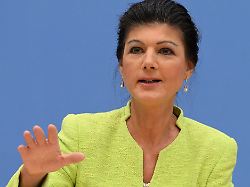RTL/ntv trend barometer
The majority does not believe that Wagenknecht can establish himself
November 10, 2023, 6:06 a.m
Listen to article
This audio version was artificially generated. More info | Send feedback
For a long time it was a mystery whether Sahra Wagenknecht would leave the Left Party and found her own group. It should be ready in January. But a majority wouldn’t vote for the new party – and don’t have much faith in the politician.
A majority of German citizens do not believe that the new party “Alliance Sahra Wagenknecht” will be able to maintain its position in the German party landscape in the long term. According to the RTL/ntv trend barometer, 54 percent express this opinion. Only a little more than a third of those surveyed (37 percent) are of the opinion that the party will establish itself. East Germans (48 percent) and AfD supporters (50 percent) are more likely than average to be convinced that the “BSW” will remain permanently in the German party landscape. Only 29 percent of Left Party supporters believe this.
In addition, a large proportion of people in Germany doubt the political competence of the former left-wing politician Sahra Wagenknecht. Around three quarters of those surveyed (72 percent) do not trust it to be able to deal with the diverse problems in Germany. Only about a quarter of those surveyed (23 percent) believe they are competent enough to solve many of the current problems. East Germans (39 percent) and supporters of the AfD (49 percent) also say this more than average, but also supporters of the Left Party (43 percent).
However, in the weekly RTL/ntv trend barometer, other parties perform even worse. When asked about the party that is most likely to solve Germany’s problems, in the latest survey, 15 percent named the CDU and CSU, 8 percent the SPD and 7 percent the Greens. The AfD says 8 percent, the FDP says it is 2 percent. The vast majority (57 percent) do not vote for any party. However, the question in the weekly survey is open-ended, while the current survey is only about the Wagenknecht party. The numbers are therefore not directly comparable.
The majority would not vote for Wagenknecht
The vast majority of 75 percent of eligible voters would currently not vote for a party led by Wagenknecht, or would definitely not vote. According to the trend barometer, just three percent of those eligible to vote would “definitely” vote for the party. 18 percent could “maybe” imagine a cross at Wagenknecht.
“Definitely” current supporters of the Left (13 percent) and supporters of one of the small splinter parties (17 percent) would be most likely to vote for a Wagenknecht party. “Maybe” 38 and 33 percent would tick here. Of the AfD supporters, 9 percent would “definitely” vote for the Wagenknecht party (“Maybe”: 35 percent), and of the East Germans 6 percent (“Maybe”: 31 percent).
Wagenknecht and nine other members of the Left announced their departure from the party more than two weeks ago and announced a competing project. The new party is scheduled to be founded next January and run in the European elections and several state elections in 2024.
Little knowledge about Wagenknecht’s goals
The low level of support for the planned party could be related to the lack of knowledge about its goals. Just a quarter of German citizens (24 percent) know what ideas and goals the “Sahra Wagenknecht Alliance” has regarding economic, social, foreign or climate protection policy. However, the vast majority (74 percent) are not exactly aware of this. 38 percent of Left Party supporters say they know the political ideas and goals of the new party. For East and West Germans as well as supporters of the other parties, this value is between 22 and 29 percent.
Among other things, Wagenknecht would like to revive economic relations with Russia and purchase cheap gas from Russia again, as before the attack on Ukraine. Only a minority of citizens (26 percent) think this is good. Significantly more citizens (69 percent) would not approve of such a rapprochement with Russia. Only East Germans (51 percent) and especially AfD supporters (73 percent) would mostly approve of such a course towards Russia.
The opinion research institute Forsa surveyed 1,001 people in Germany for the RTL/ntv trend barometer on November 7th and 8th. The statistical margin of error is +/- 3 percentage points.
